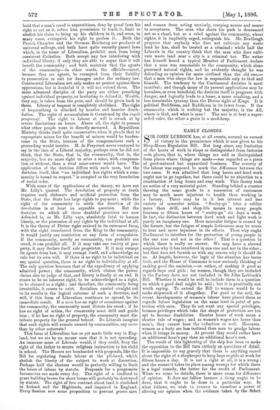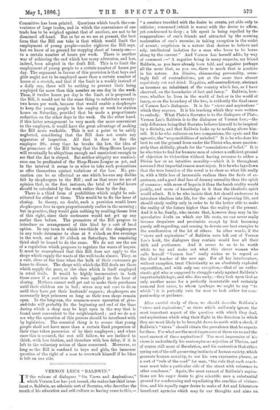EARLY CLOSING.
SIR JOHN LUBBOCK has, at all events, secured an earnest of victory in the prominence which is now given to his Shop-Hours Regulation Bill. Not long since, any limitation
of the hours of work in shops as distinguished from factories —in places, that is, where things are sold as distinguished from places where things are made—was regarded as a piece of good-natured but unpractical fussiness. The severity of the labour was supposed to mark the difference between the two cases. It was admitted that long hours and hard work ought not to go together, but there could be no objection to a combination of long hours and easy work. This theory took no notice of a very material point. Standing behind a counter showing the same goods to a succession of customers may be much more injurious to health than working in a factory. There may be in it less interest and less variety of muscular action. " Sentry-go " tries a soldier more than drill, and shop-life means to many people fourteen or fifteen hours of " sentry-go " six days a week. In fact, the distinction between hard work and light work is purely an imaginary one. More muscular fatigue is caused by the former, but the fatigue of simple listlessness may be worse to bear and more injurious in its effects. Then why ought Parliament to interfere for the protection of young people in the one case and not in the other ? That is a question to which there is really no answer. We may have a shrewd suspicion why it has interfered in one case and not in the other ; but that does not furnish us with any reason why it should do so. At length, however, the logic of the situation has borne fruit, and the House of Commons is now seriously thinking of making good the omission,—or, rather, of making it good as regards boys and girls ; for women, though they are included in the Factory Acts, are not included in Sir John Lubbock's Bill. Whether it would be well to include them is a question on which a good deal might be said ; but it is practically not worth saying. To extend the Bill to women would be to make shipwreck of it altogether. For good or for evil, the recent developments of women's labour have placed them as regards future legislation on the same level in point of pro- tection with men. They do not want any special privileges, because privileges which take the shape of protection are too apt to become disabilities. Shorter hours of work mean a shorter tale of wages ; and as women's wages are lower than men's, they cannot bear the reduction as well. Moreover, women as a body are less inclined than men to grudge labour when it brings in money. At prevent they would rather have an additional hour's pay than an additional hour's rest.
The result of this lightening of the ship has been to make the opposition to the Bill turn entirely on questions of detail. It is impossible to say gravely that there is anything sacred about the right of a shopkeeper to keep boys or girls at work for fifteen hours a day. It is not a right at all, it is a wrong ; and the sooner it takes its place among wrongs for which there is a legal remedy, the better for the credit of Parliament. When we come to details, there is more room for difference of opinion. It does not follow because a thing ought to be done, that it ought to be done in a particular way. In what follows, we wish to reserve to ourselves a power of altering our opinion when the evidence taken by the Select
Committee has been printed. Questions which touch the con- venience of large trades, and in which the convenience of one trade has to be weighed against that of another, are not to be dismissed off-hand. But so far as we see at present, the best form that the Bill can take is that which would limit the employment of young people—under eighteen the Bill says, but we know of no ground for stopping short of twenty-one— to a certain number of hours per week. There is another way of achieving the end which has many advocates, and has, indeed, been adopted in the draft Bill. This is to limit the employment of young people to a certain number of hours per day. The argument in favour of this provision is that boys and girls ought not to be employed more than a certain number of hours at a stretch, and that if the limit is a weekly instead of a daily one, there will be nothing to prevent their being employed far more than this number on one day in the week. Thus, if twelve hours per day is the limit, as is proposed in the Bill, it would not be the same thing to substitute seventy- two hours per week, because that would enable a shopkeeper to keep the young people in his employ at work for sixteen hours on Saturday, provided that he made a proportionate reduction on the other days in the week. On the other hand, if this latter arrangement be very much the more convenient to the employer, it would have the great advantage of making the Bill more workable. This is not a point to be safely neglected, considering that the Bill does not create any apparatus of inspection. All that it does is fine the employer 20s. every time he breaks the law, the idea of the promoters of the Bill being that the Shop-Hours League will eventually be ubiquitous enough and omniscient enough to see that the Act is obeyed. But neither ubiquity nor omnisci- ence can be predicated of the Shop-Hours League as yet, and in the interval it seems to us wiser to take such precautions as offer themselves against violations of the law. No pre- caution can be so effectual as one which lessens any dislike felt by shopkeepers to the Bill ; and on that score we are of opinion that, in the first instance, the total of lawful hours should be calculated by the week rather than by the day.
There is a third form of prohibition which might be sub- stituted for either of these. This would be to fix the hour of closing. In theory, no doubt, such a provision would leave shopkeepers free to open proportionately earlier in the morning ; but in practice, they would gain nothing by availing thems Ives of this right, since their customers would not get up any earlier than before. The promoters of the Bill propose to introduce an arrangement of this kind by a sort of local option. In any town in which two-thirds of the shopkeepers in any trade determine to close at 8 o'clock on five evenings in the week, and at 10 o'clock on Saturdays, the remaining third shall be bound to do the same. We do not see the use of a regulation which proposes to regulate the wants of buyers. It must be remembered that this Bill does not apply to the shops which supply the wants of the well-to-do classes. They, as a rule, close at the time when the bulk of their customers go home to dinner. The shops with which the Bill deals are those which supply the poor, or the class which is itself employed in retail trade. It would be highly inconvenient in both these cases if a cast-iron rule were applied to the hour of closing. Mothers cannot well get out to make their purchases until their children are in bed ; wives may not care to do so until they have got their husbands' suppers ; shopkeepers are necessarily kept prisoners so long as their own shops remain open. In the long-run, the common-sense operation of give- and-take will probably fix the beginning and end of the time during which a shop may be kept open in the way that is found most convenient to the neighbourhood ; and we do not see why the operation of this process should be interfered with by legislation. The essential thing is to secure that young people shall not have more than a certain fixed proportion of their time taken possession of by their employers ; and when once this is secured, the rest will follow, we are inclined to think, with less friction, and therefore with less delay, if it is left to the voluntary action of those concerned. Moreover, so long as the Bill is confined to boys and girls, the immense question of the right of a man to overwork himself if he likes is left on one side.





































 Previous page
Previous page